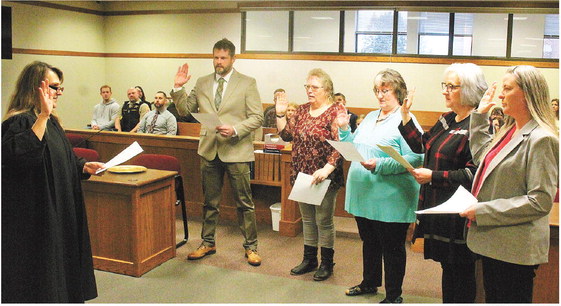Committee hires consultant for county ambulance study


Taylor County will spend $30,000 to hire a consultant to study ambulance services in the area and suggest potential alternatives to the current system.
At the August 8 law enforcement committee meeting, members approved a contract with Strategic Management and Consulting of Wisconsin Dells to look at emergency medical services in the county.
“We don’t know what we don’t know,” said committee member Lorie Floyd. She said that last year before signing the current ambulance service contract with Aspirus, she said a county board member questioned her stating they thought the county was looking at other options.
Floyd said the goal with the consultant was to have a neutral person look at the system and the county’s needs and what could be done either through Aspirus or other options.
Dana Sechler, president of Strategic Management and Consulting, said there have been changes in the laws which impact how ambulance services can operate which opens up opportunities as well as potential gray areas in billing.
He explained that the study would look at the system that was in place today and what else could be considered. Things they would be looking at include if there is enough staffing to cover today’s needs and make suggestions going forward to “have a viable and sustainable EMS for the county.”
He noted they would also be looking at the potential for community EMS. This is something that is relatively new in the laws which looks at having paramedics and EMS staff doing other things in the community other than responding to calls.
“They could work with the county health department, not in competition with but in cooperation with,” Sechler said as an option to provide services to residents which has been done in other areas. He said the study would help solidify where EMS is going in the county and look at short term and long term goals.
Sechler reviewed the proposal document which includes: This proposal is designed to provide a comprehensive overview, based on the following components/topics:
• Analysis of current operations and service delivery
• Governance, service agreements, and contracts
• Staffing methodology, including current and future needs
• Salaries and wage
• Fiscal analysis and implications.
• Planning for growth. Sechler said they have worked with towns in Vilas County which had been operating separate systems and which are now combining into a shared service improving service. He said they would be looking at taking call data and creating “heat maps” that show where calls are coming from and seeing if the ambulances are stationed in the right areas to be able to respond in a timely manner.
Sechler also emphasized that while there can be benefits of a county-wide approach to ambulance service it is still ultimately up to the local municipalities for responsibility for the service.
“State law says villages and towns shall [provide EMS coverage],” Sechler said, noting that when it comes to cities, the law says they “may” provide EMS services.
As far as how long the study would take, Sechler said it would depend in large part on how fast they can access local data. He estimated it would take a month or two to go through the data.
Committee member Chuck Zenner asked if the study would make suggestions to what the county could be doing differently.
“There are so many opportunities now than what was available years ago,” he said.
Floyd said the county chose to have a contract with Aspirus and said she was not sure that if it was the best contract, simply because “[W]e don’t know what we don’t know.” She noted the study may help the county better working with Aspirus.
“I think we have a pretty good idea what our public wants,” she said.
Money for the study will come from the current ambulance budget. Zenner noted that because it is using money in their budget, it does not have to go to the finance committee or the full county board for additional approval.
Committee members unanimously approved hiring the consultant to conduct the study.
In other business, committee members:
• Approved allowing the emergency management director to participate in the 10-33 program partnership with the federal government in order to be able to get surplus military equipment. This program has been in place for law enforcement for some time. Emergency management director Dan Gellert said they would be looking at things like tents and generators which could be used in emergency situations in the county. Sheriff Larry Woebbeking said any items would need to be accounted for under the sheriff’s department. He also cautioned that anything they get would need to be stored and have ongoing service.
“The MRAP has been an expensive program for us,” Woebbeking said of the military surplus tactical response vehicle the county got at no cost from the program in the past.
“It gives us a better window to open up,” Gellert said of having access to surplus equipment that may be beneficial to the county.
Floyd made the motion to give Gellert permission to get items from program, adding “I want you to come and ask for our permission before you buy a tank.”
• Received the sheriff’s report. There are 56 inmates in the county jail with 26 of them from Marathon County. Woebbeking reported the new jail medical services provider had recently started and that there were some issues they were working through. He also reported that he had reached out to the person who had purchased an old Taylor County Ambulance and was using it as a recreational vehicle about removing or painting over the Taylor County decals on it. “He was nice enough,” Woebbeking said about his willingness to do this.



